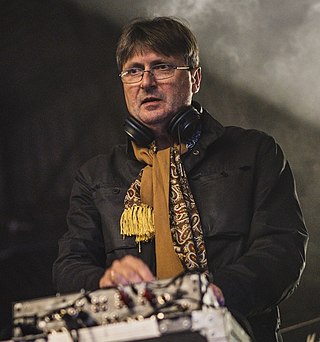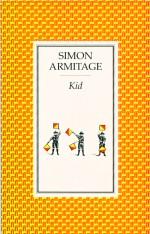
Simon Robert Armitage is an English poet, playwright, musician and novelist. He was appointed Poet Laureate on 10 May 2019. He is professor of poetry at the University of Leeds.
Confessional poetry or "Confessionalism" is a style of poetry that emerged in the United States during the late 1950s and early 1960s. It is sometimes classified as a form of Postmodernism. It has been described as poetry of the personal or "I", focusing on extreme moments of individual experience, the psyche, and personal trauma, including previously and occasionally still taboo matters such as mental illness, sexuality, and suicide, often set in relation to broader social themes.

Susan Howe is an American poet, scholar, essayist, and critic, who has been closely associated with the Language poets, among other poetry movements. Her work is often classified as Postmodern because it expands traditional notions of genre. Many of Howe's books are layered with historical, mythical, and other references, often presented in an unorthodox format. Her work contains lyrical echoes of sound, and yet is not pinned down by a consistent metrical pattern or a conventional poetic rhyme scheme.
Denise Riley is an English poet and philosopher.
David Harsent is an English poet who for some time earned his living as a TV scriptwriter and crime novelist.

Kid is the second collection of poems by Simon Armitage, published in 1992. The book won a Forward Prize for Poetry.

Sean O'Brien FRSL is a British poet, critic and playwright. Prizes he has won include the Eric Gregory Award (1979), the Somerset Maugham Award (1984), the Cholmondeley Award (1988), the Forward Poetry Prize and the T. S. Eliot Prize (2007). He is one of only four poets to have won both the T. S. Eliot Prize and the Forward Poetry Prize for the same collection of poems.
Calvin Thomas is an American academic who works in the fields of critical theory, modern and postmodern literature and culture. He is a professor at Georgia State University. His writings have focused on gender, sexuality and the body, with an especial interest in "straight" responses to queer theory.
David Armitage is a British historian who has written on international and intellectual history. He has been chair of the history department and is Lloyd C. Blankfein Professor of History at Harvard University.
Richard Marggraf Turley is a British literary critic, poet and novelist. He specialises in Romanticism and the poetry of John Keats, surveillance studies and ecocriticism. He is professor of English Literature at Aberystwyth University, and between 2013 and 2018 was that institution's Professor of Engagement with the Public Imagination.
Robert Crawford is a Scottish poet, scholar and critic. He is emeritus Professor of English at the University of St Andrews.
Robert T. Tally Jr. is a professor of English at Texas State University. His research and teaching focuses on the relations among space, narrative, and representation, particularly in U.S. and comparative literature, and he is active in the emerging scholarly fields of geocriticism, literary geography, and the spatial humanities. Tally is the editor of "Geocriticism and Spatial Literary Studies," a Palgrave Macmillan book series established in 2013. The translator of Bertrand Westphal's Geocriticism: Real and Fictional Spaces and the editor of Geocritical Explorations, In addition to his numerous essays on literature, criticism, and theory, Tally has written books on Herman Melville, Edgar Allan Poe, Kurt Vonnegut, and J.R.R. Tolkien's The Hobbit, as well as a critical introduction to the work of literary critic and theorist Fredric Jameson.
William Franke is an American academic and philosopher, professor of Comparative Literature at Vanderbilt University. A main exposition of his philosophical thinking is A Philosophy of the Unsayable (2014), a book which dwells on the limits of language in order to open thought to the inconceivable. On this basis, the discourses of myth, mysticism, metaphysics, and the arts take on new and previously unsuspected types of meaning. This book is the object of a Syndicate Forum and of a collective volume of essays by diverse hands in the series “Palgrave Frontiers in Philosophy of Religion”: Contemporary Debates in Negative Theology and Philosophy. Franke's apophatic philosophy is based on his two-volume On What Cannot Be Said: Apophatic Discourses in Philosophy, Religion, Literature, and the Arts (2007), which reconstructs in the margins of philosophy a counter-tradition to the thought and culture of the Logos. Franke extends this philosophy in an intercultural direction, entering the field of comparative philosophy, with Apophatic Paths from Europe to China: Regions Without Borders. In On the Universality of What is Not: The Apophatic Turn in Critical Thinking, Franke argues for application of apophatic thinking in a variety of fields and across disciplines, from humanities to cognitive science, as key to reaching peaceful mutual understanding in a multicultural world riven by racial and gender conflict, religious antagonisms, and national and regional rivalries.
Edward Ragg is a British poet, critic and writer on wine who, since 2007, has lived in Beijing, China. He was a Cinnamon Press Poetry Award winner (2012) and his first book of poetry was A Force That Takes. In 2007 he co-founded Dragon Phoenix Wine Consulting with his wife, the wine expert, Fongyee Walker, Master of Wine (MW). In 2010 he was the first foreigner to become an Associate Professor in the Department of Foreign Languages and Literatures at Tsinghua University. In 2019 Ragg also became a Master of Wine (MW) as well as wine reviewer for Chinese wines for The Wine Advocate.
Martin Francis is a British-American academic historian. He was Henry R. Winkler Professor of Modern History at the University of Cincinnati from 2003 to 2015, when he was appointed Professor of War and History at the University of Sussex.

Josep María Armengol Carrera is a Spanish literary scholar and researcher in the field of gender and masculinity studies.
Shyamal Bagchee is an Indo-Canadian poet, scholar, and a serious photographer. He is particularly interested in critical theory, poetry and poetics, eroticism, and their socio-cultural and philosophical underpinnings. Shyamal Bagchee earned a BA degree with Honours in 1965 from University of Delhi and two years later he received a Master of Arts in English and American literature from Visvabharati University followed by another MA from McMaster University, Canada. In 1981 Bagchee earned his doctoral degree from York University in Toronto before joining University of Alberta to teach English literature, Literary Theory and Cultural Studies. He moved rapidly through academic ranks: 1982 Assistant Professor, 1985 Associate Professor, 1991 Full Professor, 2015 Professor Emeritus--to date).

Magnetic Field: The Marsden Poems is a 2020 collection of poems by the English poet Simon Armitage. All 50 of the poems, written throughout his career, relate to places in his home village of Marsden, West Yorkshire. The book contains maps of the village, showing where each poem is situated. Armitage is a professor of poetry, and became Poet Laureate in 2019. He states that he found that he had been using Marsden to chart the effects of problems with the British economy and the sense of marginalisation that he felt.

Zoom! is a 1989 book of poetry by the British poet Simon Armitage, and his first full-length collection. It was selected as a Poetry Book Society Choice, shortlisted for the Whitbread Poetry Award, and was made the PBS Autumn choice.

VAS: An Opera in Flatland is a novel by the American author Steve Tomasula with design by Stephen Farrell. It was first published in hardback in 2002, and reissued in paperback in 2004. A special “Cyborg” edition, with an audio CD was published in 2009. The novel adapts several characters and settings from Edwin A. Abbott’s novella Flatland: A Romance of Many Dimensions, first published in 1884. Set at the start of the 21st century when technologies like cloning, transplants, and other body modifications were becoming common, VAS employs a wide range of historical representations of the body from family trees and eugenic charts to visual representations of genetic sequencing. Bound in a cover that resembles human skin, the novel is printed in two colors, one that resembles flesh and one that resembles blood. It explores how definitions of the body and the self both emerge from differing narratives, and tells the story of people searching for a sense of identity in a dawning post-biological future.








